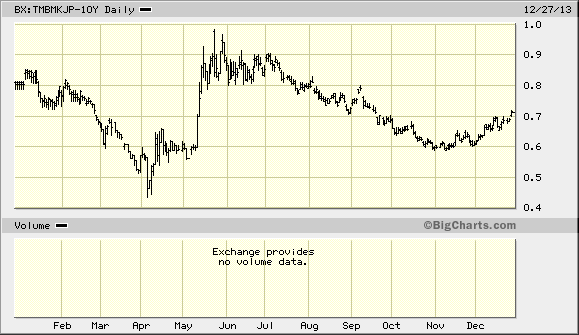You don’t get every trade right, unfortunately. Sometimes, even the best-thought-out investment thesis turns out to be flat-out wrong.
My biggest blunder of 2013? Shorting Japanese bonds.
In the June issue of Macro Trend Investor (formerly the Sizemore Investment Letter) I recommended readers buy shares of the PowerShares DB 3X Inverse Japan Government Bond ETN (JGBD), a leveraged ETN that bets against Japanese government bonds. I ended up selling about six weeks later at a modest 2.6% loss, but it’s not the portfolio loss that made this my mea culpa for 2013 but rather the opportunity cost. I could have made a fortune in Japan by playing my cards differently.
Let’s flash back to May. Abenomics has been in effect for about five months, and Japan is starting to see its first flashes of inflation in years. The Fed’s initial tapering comments have turned world debt markets upside down, and Japan’s 10-year bond yield has soared from 0.6% to 1.0% in just weeks.
The moment I had been waiting for appeared to have finally arrived. The bond vigilantes had awoken from their long slumber and had at last come to rout the Japanese bond market. It certainly took them long enough. Japan’s sovereign debts, at 250% of GDP, are the highest in the world, dwarfing those of the U.S. and Europe. And with annual budget deficits at close to 10% of GDP, Japan has been adding to that debt load at a speed that should be alarming to anyone who cared to look.
As I wrote in February, “debt service now accounts for 43% of Japanese government revenues and quarter of all spending. Furthermore, more than half of all Japanese government spending is financed by new borrowing… It’s a debtor’s nightmare.”
The house of cards was kept up by Japan’s high domestic savings rate. But as Japan’s population has aged and a much larger percentage of Japanese citizens are now retired, the savings rate has plummeted. At less than 2%, the Japanese savings rate is now lower than that of “spendthrift” Americans.
With Japanese investors no longer in a position to soak up their government’s new bond issues, it left two potential buyers—the international bond market and the Bank of Japan. And at the time, the Bank of Japan already bought 70% of the new bonds issued by the Japanese government. As I wrote in the June issue of Macro Trend Investor, “The way I see it, there are two possibilities here. Either the 10-year sinks back into its long trading range and the day of reckoning is postponed for a while…or things get really choppy really fast.”
Well, as it would turn out, the day of reckoning was indeed postponed. Calm returned to the Japanese bond market, and yields sank back to 0.6%. If I had it to do over again, I would have simply jumped on the macro bandwagon of going long Japanese equities and short the yen. An ETF that essentially follows this strategy– WisdomTree Japan Hedged Equity (DXJ)—is up 52% over the past 12 months.
Live and learn…
Disclosure: Charles Lewis Sizemore, CFA, is the editor of Macro Trend Investor and chief investment officer of the investment firm Sizemore Capital Management.
- English (UK)
- English (India)
- English (Canada)
- English (Australia)
- English (South Africa)
- English (Philippines)
- English (Nigeria)
- Deutsch
- Español (España)
- Español (México)
- Français
- Italiano
- Nederlands
- Português (Portugal)
- Polski
- Português (Brasil)
- Русский
- Türkçe
- العربية
- Ελληνικά
- Svenska
- Suomi
- עברית
- 日本語
- 한국어
- 简体中文
- 繁體中文
- Bahasa Indonesia
- Bahasa Melayu
- ไทย
- Tiếng Việt
- हिंदी
My Mistake Of 2013: Shorting Japanese Bonds
Published 01/06/2014, 03:14 AM
Updated 07/09/2023, 06:31 AM
My Mistake Of 2013: Shorting Japanese Bonds
Latest comments
Loading next article…
Install Our App
Risk Disclosure: Trading in financial instruments and/or cryptocurrencies involves high risks including the risk of losing some, or all, of your investment amount, and may not be suitable for all investors. Prices of cryptocurrencies are extremely volatile and may be affected by external factors such as financial, regulatory or political events. Trading on margin increases the financial risks.
Before deciding to trade in financial instrument or cryptocurrencies you should be fully informed of the risks and costs associated with trading the financial markets, carefully consider your investment objectives, level of experience, and risk appetite, and seek professional advice where needed.
Fusion Media would like to remind you that the data contained in this website is not necessarily real-time nor accurate. The data and prices on the website are not necessarily provided by any market or exchange, but may be provided by market makers, and so prices may not be accurate and may differ from the actual price at any given market, meaning prices are indicative and not appropriate for trading purposes. Fusion Media and any provider of the data contained in this website will not accept liability for any loss or damage as a result of your trading, or your reliance on the information contained within this website.
It is prohibited to use, store, reproduce, display, modify, transmit or distribute the data contained in this website without the explicit prior written permission of Fusion Media and/or the data provider. All intellectual property rights are reserved by the providers and/or the exchange providing the data contained in this website.
Fusion Media may be compensated by the advertisers that appear on the website, based on your interaction with the advertisements or advertisers.
Before deciding to trade in financial instrument or cryptocurrencies you should be fully informed of the risks and costs associated with trading the financial markets, carefully consider your investment objectives, level of experience, and risk appetite, and seek professional advice where needed.
Fusion Media would like to remind you that the data contained in this website is not necessarily real-time nor accurate. The data and prices on the website are not necessarily provided by any market or exchange, but may be provided by market makers, and so prices may not be accurate and may differ from the actual price at any given market, meaning prices are indicative and not appropriate for trading purposes. Fusion Media and any provider of the data contained in this website will not accept liability for any loss or damage as a result of your trading, or your reliance on the information contained within this website.
It is prohibited to use, store, reproduce, display, modify, transmit or distribute the data contained in this website without the explicit prior written permission of Fusion Media and/or the data provider. All intellectual property rights are reserved by the providers and/or the exchange providing the data contained in this website.
Fusion Media may be compensated by the advertisers that appear on the website, based on your interaction with the advertisements or advertisers.
© 2007-2025 - Fusion Media Limited. All Rights Reserved.
